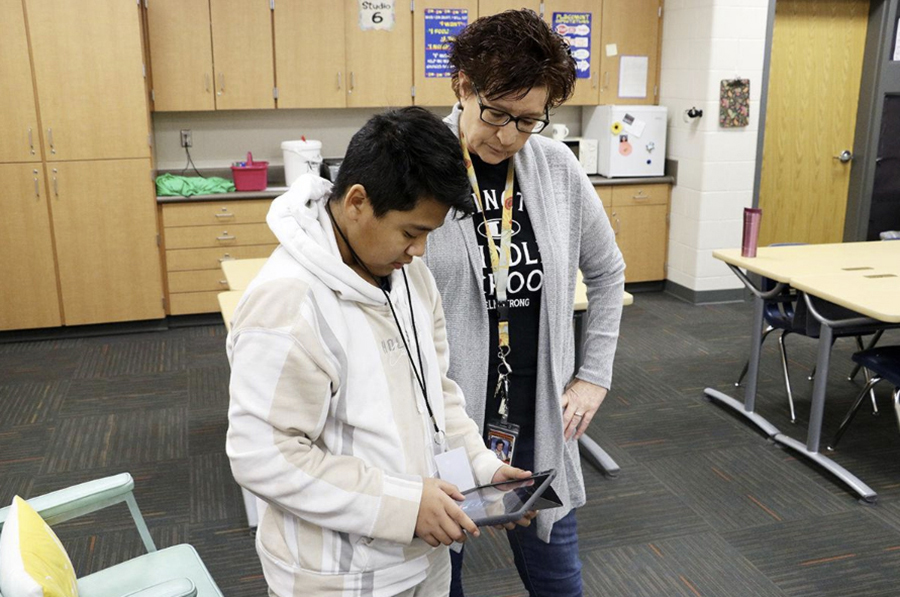
by Brian Neben, Lexington Clipper-Herald, March 10, 2020
LEXINGTON — It’s a far cry from the typewriters and dot matrix machines which used to be the staple of classrooms, but robotic programming brought wonder and curiosity to a Lexington Middle School classroom thanks to the AIR@NE grant from the University of Nebraska-Lincoln.
Reading, writing and arithmetic have long been mainstays in education, but with the evolving technology of the modern day, UNL researcher Leen-Kiat Soh thought it was time to bring more computer science opportunities to the classroom, according to a UNL press release.
Taking advantage of a four year, $2 million grant from the National Science Foundation, UNL is developing a program aimed at helping the state’s educators teach computer science to a diverse group of K-8 students.
"In Nebraska and many other states, there’s a lack of standardized K-12 computer science curricula and a dearth of K-12 educators equipped to teach the subject," according to the press release, "And for those who do teach computing in Nebraska, no specialized training is required, raising questions of quality and standards."
There were 29 teachers in the first cohort and each was given $1,500 which went toward conference travel or to buy materials like robots, according to CSMCE Assistant Director & Communications Coordinator Lindsay Augustyn.
Patti Maguire is the only Lexington teacher in the first cohort.
"The teachers bought incredibly neat classroom technologies like Cue and Dash robots by Wonder Workshop, Bee Bots, Sphero Bolts, UBTECH Jimu Robots, Micro:bits, and Osmo coding kits," Augustyn said, "Patti got Cue robots and Sphero Bolts."
On Friday morning, Maguire’s sixth graders were on their fifth day of working with the Cue robots and she said they had spent the time learning to code and manipulate the robot to perform certain tasks, such as maneuvering around obstacles or pickup up items.
One student Anthony Sanchez, was trying to code his Cue ‘bot to maneuver around four cups which formed a square. Maguire explained the students could program the robot a certain direction and distance to travel.
Another student, Daniel Prado-Segura had attached grabber arms to his robot and had programmed it to pick up items and move them to a different location.
Maguire said the robotic programming held the students put math concepts they learned abstractly in the classroom, into physical practice. Concepts like degrees such as 180 degrees or -90 degrees were important in the programming and allowed the students hands on experience with the ideas, Maguire said.
Programming not only brought math concepts into reality, but it also gave the students the opportunity to problem solve and troubleshoot.
"As they face challenges, they need to be problem solvers," Maguire said.
The programming promoted, "computational thinking, said Maguire, and the process encouraged students to break down the issue into parts and solve it step by step.
One of the most valuable lessons which the programming taught was failure. One time Sanchez’s robot went too far and hit the wall and Prado-Segura’s robot had trouble grasping a round object as opposed to a square one. Yet the students kept trying and worked to "debug their program," Maguire said.
Concepts the students had to learn while they were programming were written on the board, ergonomics, constraints, animate, algorithm, program, sequence, loop and debug were all ideas the students had to deal with while working.
Maguire said it was great to see, "wonder and curiosity," among the students during the week they had programming the robots.
In some ways the students took to programing like a fish to water. In an email to Augustyn, Maguire said she was instructing the students about the use of a function, and soon they were creating their own functions after only a single experience writing one.
The second cohort begins on June 8 in Grand Island where 24 teachers have signed up so far, and the third cohort will begin in 2021 in Omaha, Augustyn said.
"Some kids, especially in urban areas, have access to computer science enrichment activities that happen outside of school," Nebraska Center for Research on Children, Youth, Families and Schools research professor Gwen Nugent said. "But to be able to exist in today’s connected world, all kids need to develop these computational skills early on in school."